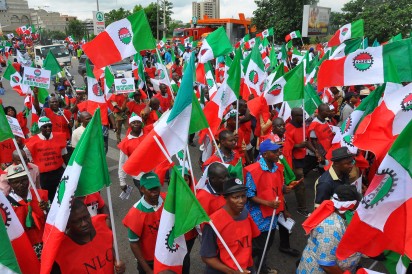
In response to demands by labour unions, a presidential committee has just been inaugurated to look into the possibility of increasing workers’ take home pay. On the surface, salary increase may be commendable but hardly the answer to the hardship wage earners are going through. This view is without prejudice to whatever are the intentions of the government in setting up that committee. We think that putting more money in the pockets of workers will not improve their living standards. We said so in an earlier editorial by the above caption here recalled. This newspaper’s position on the subject has not changed.
For some time now, Labour has been angling for a review of workers’ wages and salaries in response to the palpable hardship pervading across the nation which is having a greater adverse impact on salary earners. The general complaint and very genuine too, is that the workers’ take home pay can no longer take them home in the face of spiralling inflation occasioned by the recession that is plaguing the economy. The labour unions, confronted by the realities of the situation, have decided to engage the federal government on this issue so as to compel them to revise workers terms of service and, in particular, revisit the pay structure in line with the harsh conditions they face.
To drive home their point, they have recommended N56, 000 as minimum wage up from N18, 000. In principle, the government is not averse to the proposal. Feelers from official circles indicate that already, a technical committee is working on the feasibility of such a proposal and other modalities attendant to it.
Always, we will remain committed to and in full support of efforts geared towards the alleviation of the plight of wage earners buffeted on all sides by unfavourable economic circumstances beyond their control. However, we responsibly argue that workers welfare ought not to be all about cash in the pocket that can be rendered worthless by rising cost of living that trails every salary increase.
It is from this perspective that we aver that the suggested N56, 000 as minimum wage is not only ambitious but way out of what is achievable. We are not saying that the country cannot afford to pay that amount as minimum wage. The point we make is that the economy, as it is now, is too fragile and precarious for that kind of blind leap. Nigerians, and especially the labour unions, know the battle they fought to convince some states to pay the N18, 000 that was approved by the National Assembly. And even then, not many of them are consistent in the payment of staff salaries as at when due based on that scale. The bailout approved by President Muhammadu Buhari was not sufficient to improve the regularity of wage payments in the states. Most of them, to be able to pay at all, reduced their staff strength and froze employment into Ministries, Departments and Agencies (MDAs). Even with those panic measures, they are still many months in arrears. Instead of a wage increase, the unions should take on the governments at all levels and demand that regular payment of salaries must not be politicised. What is going on now is that politicians’ count payment of salaries as an achievement when canvassing for votes. That, we insist, is reprehensible.
We are not suggesting that the union leaders are seeking for cheap popularity or, for that matter, playing to the gallery to give their members the impression that their welfare is receiving attention. In our considered opinion, the unions need to restrategise and channel their struggles towards other measures that can practically improve the standard of living of the suffering workers. Some of these measures in our view, include incentivising the real sector, that is, the manufacturers to enable them to expand and create job opportunities for Nigerian youths. The unions’ package in their negotiations with government should also ensure that ongoing activities in the agricultural sector is sustained because of its multiplier effect on the economy in terms of job creation, bringing down the price of food stuff and encouraging exports so as to earn the much needed foreign exchange. They should put pressure on the relevant authorities to improve infrastructure such as power and roads as well as make cost of funds affordable. If these are attained, they have the potentials to cause the economy to grow exponentially and bring down the cost of living in a way that the present N18, 000 will become enough to take care of workers and their families.
We are sufficiently persuaded to reason that if the present scenario did not change for the better, agitation for wage review will sooner than later become a vicious cycle, academic and unhelpful to the overall wellbeing of the ordinary Nigerian worker who will be left in the lurch.
END

Be the first to comment